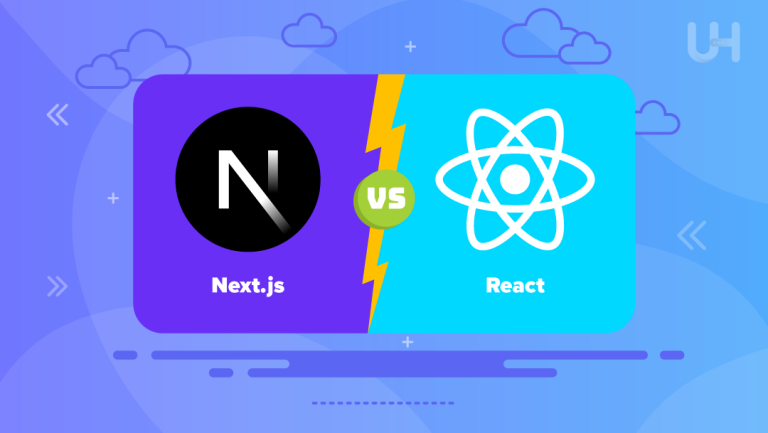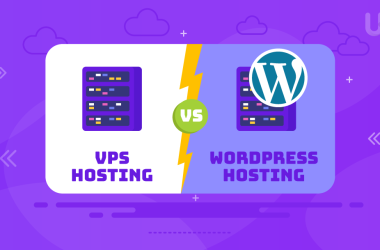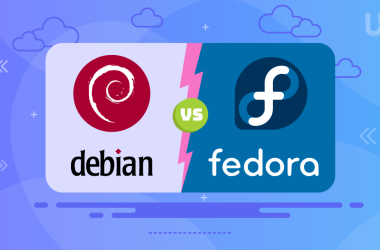Next.js and Nuxt.js are popular, modern frameworks for creating web apps using React and Vue. Both of these are static site generators following Jamstack architecture. Next.js was designed for CSR and SSR and built by Vercel, which is why it is considered ideal for full-stack applications with React. Nuxt.js is an open-source framework based on Vue intended to efficiently develop universal, complex applications. Despite Next.js vs Nuxt.js, there are many similarities between the frameworks, which makes choosing the right one for your project a bit difficult.
In this article, we will examine the differences between Next.js and Nuxt.js, including their pros, cons, features, and use cases. This will help you make an informed decision regarding which framework is best for you.
What is Next.js
Next.js is a powerful framework that enhances the capabilities of React, a popular library for building or rebuilding websites. This framework excels in creating web applications prioritizing speed and accessibility, ensuring that all users can effectively engage with the content, regardless of how they access the Internet.
Key Features of Next.js
Next.js offers a range of significant features that enhance web application development experience and performance.
- File-Based Routing: This feature uses the files you create to determine how your website’s pages are structured and displayed.
- Server-Side Rendering: This process generates your pages on a dedicated hosting server first, which can enhance your website’s loading speed.
- Incremental Static Regeneration: This capability allows you to update static pages without needing to rebuild the entire site.
- Image Optimization: This feature ensures that your images load more quickly.
- API Routes: In Next.js, you can create parts of your application programming interface (API) that communicate directly with databases.
- CSS Support: You can style your website using CSS.
Advantages of Next.js
Reasons to consider using Next.js:
- It makes your site run smoother and faster.
- It’s better for getting your site seen on Google.
- You can build things quickly using stuff from the React world.
- It can handle a lot of visitors at once.
- Putting your site online is easy, especially on platforms like Vercel.
Disadvantages of Next.js
Here are some reasons why Next.js might be challenging:
- Some parts might be hard to learn at first.
- If your site is very complex, it might not fit perfectly.
- You have to use React for everything.
Popular Use Cases for Next.js
Next.js is a versatile framework commonly used for developing various types of websites. Some of the most frequently built websites with Next.js include:
Static Websites
Ideal for content-heavy sites that require fast loading times and SEO optimization, such as blogs and portfolios.
Dynamic Web Applications
Suitable for applications requiring real-time data updates, like dashboards and social media platforms.
E-commerce Sites
Effective for eCommerce platforms due to its ability to handle dynamic product listings and user authentication seamlessly.
Landing Pages
Next.js is great for creating high-converting landing pages that drive conversions and showcase products efficiently.
Corporate Websites
Many companies use Next.js for their corporate websites to ensure a professional online presence with scalability.
SaaS Products
As a framework that supports server-side rendering, Next.js is often utilized for software-as-a-service applications.
Next.js provides the flexibility, performance, and features needed to create a wide range of web applications and websites.
What is Nuxt.js?
Nuxt.js is an open-source framework designed for building web applications with Vue.js. It simplifies the development process by optimizing page loading speed and providing built-in features for ensuring responsive design across various devices. Meanwhile, this tool effectively handles many complexities of web development, allowing developers to focus on creating high-quality user experiences.
Achieve Outstanding Development Performance!
Are you seeking the perfect VPS hosting for your Next.js or Nuxt.js applications? Ultahost offers speed, security, and SEO advantages. Enhance your project’s potential today!
Key Features of Nuxt.js
Nuxt.js offers several impressive features, including:
- Automatic Routing: This feature automatically determines how to navigate your site based on your files, eliminating the need for manual setup.
- Server-Side Rendering: It delivers your pages from the server first, improving loading speed and enhancing your site’s visibility online.
- Powerful Data Handling: Easily access data from various sources, whether you are using a computer or a mobile device.
- Vue Resources: It includes tools for managing your site’s data and handling changes without requiring additional setup.
- Static Site Generation: Nuxt can generate a fully static version of your site, making it exceptionally fast and reliable.
Advantages of Nuxt.js
Here are some advantages of using Nuxt.js:
- It makes web development easier.
- Your site might look better in search results if you use server rendering.
- It’s built to work seamlessly with Vue, meaning that you get many tools and plugins to make your site even better.
Disadvantages of Nuxt.js
Some disadvantages include:
- There’s more to learn if you’re new at Vue.
- More significant sites with a lot of data may get tricky.
- Few people use it, so finding help or resources might be more complex.
Popular Use Cases for Nuxt.js
Nuxt.js is an excellent choice for a variety of web development projects, including:
- Websites that are designed to promote products or services allow for an engaging user experience.
- Online stores that require robust features to handle e-commerce processes efficiently.
- Whether personal or business-focused, blogs provide a seamless content management system.
- Web applications that need to manage and present a large amount of information effectively.
Its versatility makes Nuxt.js a powerful framework for modern web applications.
Next.js vs Nuxt.js: Comparison Table
| Feature | Next.js | Nuxt.js |
| Base Framework | React | Vue.js |
| Customization | High | Moderate |
| Learning Curve | Depends on React knowledge | Depends on Vue.js knowledge |
| SEO Excellent | Excellent | Excellent |
| Use Case | Large, complex applications | Quick, smaller projects |
Key Features Comparison Between Next.js and Nuxt.js
Here is a side-by-side feature comparison between Nuxt.js and Next.js:
Next.js vs Nuxt.js: Performance
Next.js is taken to be one of the best performing frameworks, mainly because of its optimized build processes and generation of static sites. The most interesting feature in Next.js is the incremental static regeneration, which enables updating content without needing a complete rebuild, hence making things much faster.
On the other hand, Nuxt.js also provides optimization but depends a lot on the inner potential Vue.js can afford. Nuxt.js will definitely keep pages fast thanks to its server-side rendering; however, it may need to catch up Next in big projects.
Accessibility between Next.js and Nuxt.js
For developers who are already acquainted with React, Next.js presents a relatively simple framework to work with. However, its flexibility can pose a challenge for beginners, as it often requires manual setup of various configurations. In contrast, Nuxt.js provides a more user-friendly experience, emphasizing convention over configuration. Its modular architecture allows newcomers to navigate the framework with greater ease and enables quicker project initiation.
Next.js or Nuxt.js: Hosting and Deployment
Both Next.js and Nuxt.js frameworks offer various hosting options, but they are particularly effective when used with certain hosting services. Next.js, for example, integrates smoothly with Vercel and also supports platforms such as AWS and Azure. On the other hand, Nuxt.js is compatible with hosting services like Netlify, Heroku, and AWS Lambda.
Optimal Hosting for Next.js and Nuxt.js
Choosing a proper hosting service is the key to making a great difference in efficiency and effectiveness in your development environment. Especially when choosing between Next.js and Nuxt.js, every framework gets great value under specific hosting types that will take good care of its unique needs. Here, we feature three hosting services specialized for developers working with these technologies:
NVMe VPS

NVMe Server Hosting utilizes Non-Volatile Memory Express technology, which provides rapid data access. These services deliver faster data transfer speeds and lower latency compared to traditional SSD drives. This enhanced performance accelerates processes and supports an efficient workflow in Next.js development by reducing build times and streamlining redeployments.
SEO Hosting
Applications that require strong search engine optimization often utilize SEO VPS hosting to cater to their needs. While, this type of hosting typically includes integrated tools and software designed to improve server response times, which are crucial for maintaining SEO rankings in Next.js applications. With fast server responses and guaranteed uptime, this hosting solution helps ensure that web applications remain favorable to search engines.
DDoS Protected Hosting
Security is one of the topmost concerns while developing a web service since DDoS attacks are a major online threat. Hosting your development environment within a DDoS protected hosting means layers of multiple defenses are put in place to ensure that the attacks do not interrupt your applications’ smooth running within the deployment environment. This hosting goes a long way toward making sure both Next.js and Nuxt.js projects are not offline for too long, giving way to grabbing potential losses in user engagement and trust.
Conclusion
While comparing Next.js and Nuxt.js, they both are powerful frameworks for web development, each suited to different ecosystems. Next.js, built on React, is perfect for large-scale applications, making it ideal for developers familiar with React. Nuxt.js, based on Vue, excels in creating visually engaging, SEO-optimized sites with minimal setup. The choice between Next.js and Nuxt.js depends on your project’s requirements, team expertise, and application scale. Consider each framework’s strengths to align with your development goals.
Every developer must choose the best web hosting solutions. With Ultahost’s dependable and efficient services, you can ensure that your Next.js and Nuxt.js projects are hosted on a platform that maximizes performance and scalability.
FAQ
What are the main differences between Next.js and Nuxt.js?
Next.js is built on React, while Nuxt.js is based on Vue.js. Their key differences lie in their ecosystems and approaches to server-side rendering.
Is Next.js better than Nuxt.js?
It depends on your project. Choose Next.js for large-scale and flexible applications. Opt for Nuxt.js if you’re working with Vue and prefer a more structured framework.
Can I switch between Next.js and Nuxt.js?
Switching would require a significant rewrite as they are based on different libraries (React vs. Vue).
Are Next.js and Nuxt.js free?
Yes, both frameworks are open-source and free to use.
Which hosting solution is best for Next.js and Nuxt.js apps?
For scalability and performance, VPS Hosting or Dedicated Hosting is ideal.
Can I use Next.js or Nuxt.js for e-commerce?
Absolutely! Both frameworks are excellent for building fast, scalable e-commerce platforms.
Which framework is easier for beginners?
Nuxt.js is generally considers as a more beginner-friendly due to its opinionated structure.










